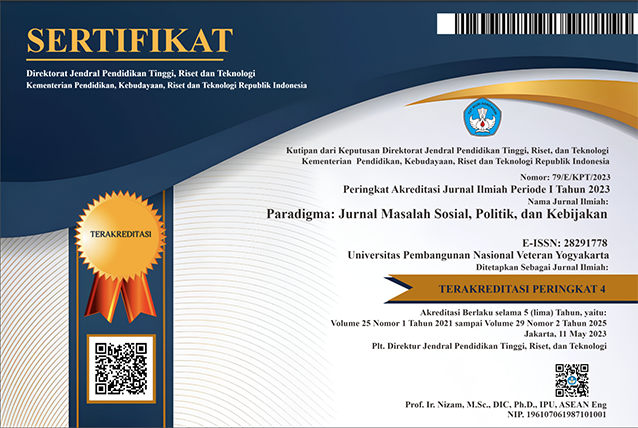Budaya Jawa dan Kewirausahaan Perempuan
DOI:
https://doi.org/10.31315/paradigma.v27i2.10099Keywords:
budaya jawa, orientasi kewirausahaan, kewirausahaan perempuanAbstract
Tren kewirausahaan perempuan terus meningkat, terutama dalam sektor usaha mikro, kecil, dan menengah (UMKM). Namun, isu budaya dalam perspektif gender masih menjadi kendala bagi perempuan untuk mengelola bisnis di beberapa wilayah. Penelitian ini dilakukan untuk menguji pengaruh antara budaya jawa dan orientasi kewirausahaan perempuan. Berdasarkan data dari 100 pengusaha perempuan UMKM Kota Semarang yang dianalisis dengan menggunakan SPSS, hasil studi menunjukkan bahwa budaya jawa berpengaruh terhadap orientasi kewirausahaan perempuan. Perempuan jawa pada era modern mampu mengembangkan potensi diri di ruang publik. Partisipasi mereka didukung oleh keluarga untuk menggeluti dunia bisnis.
References
Alkhafaji, A. F. (2003). Strategic Management: Formulation, Implementation, and Control in a Dynamic Environment. Haworth Press.
Anderson, B. S., Kreiser, P. M., Kuratko, D. F., Hornsby, J. S., & Eshima, Y. (2015). Reconceptualizing entrepreneurial orientation. Strategic Management Journal, 36(10), 1579–1596. https://doi.org/10.1002/smj.2298
Anna, R. T. (2014). Perempuan Pebisnis Dalam Budaya Jawa di Semarang. Universitas Diponegoro.
Aponno, E. H. (2017). Budaya Lokal Maluku “ Pela Gandong ” Dalam Konteks Perilaku Organisasi. Jurnal Manajemen, 03(01), 12–25.
Aryaningtyas, A. T., & Palupiningtyas, D. (2019). Pengaruh Kepribadian Proaktif terhadap Intensi Kewirausahaan Mahasiswa: Pendidikan Kewirausahaan sebagai Variabel Moderasi. Matrik : Jurnal Manajemen, Strategi Bisnis Dan Kewirausahaan, 13(1), 15–25. https://doi.org/10.24843/matrik:jmbk.2019.v13.i01.p02
Babbitt, L. G., Brown, D., & Mazaheri, N. (2015). Gender, Entrepreneurship, and the Formal-Informal Dilemma: Evidence from Indonesia. World Development, 72, 163–174. https://doi.org/10.1016/j.worlddev.2015.02.019
Bachmann, J. T., Engelen, A., & Schwens, C. (2016). Toward a Better Understanding of the Association Between Strategic Planning and Entrepreneurial Orientation — The Moderating Role of National Culture. Journal of International Management, 22(4), 297–315. https://doi.org/10.1016/j.intman.2016.03.002
Bandura, A. (1971). Social Learning Theory. General Learning Press.
Bashir, M. (2014). Factors Affecting the Decision Making of Female Entrepreneurs: A Research in Pakistani Context. Proceedings of the 2nd International Conference on Management, Leadership and Governance, 26–35.
Bateman, T. S., & Crant, J. M. (1993). The Proactive Component of Organizational Behavior: A Measure and Correlates. Journal of Organizational Behavior, 14(2), 103–118.
Bennett, R. C., & Cooper, R. G. (1979). Beyond the Marketing Concept. Business Horizons, 22(3), 76–83.
Bojica, A. M., Fuentes, M. del mar, & Gomez-Gras, J. M. (2011). Radical and incremental entrepreneurial orientation : The effect of knowledge acquisition. Journal of Management & Organization, 17(3), 326–343.
Budiati, A. C. (2010). Aktualisasi Diri Perempuan Dalam Sistem Budaya Jawa (Persepsi Perempuan terhadap Nilai-nilai Budaya Jawa dalam Mengaktualisasikan Diri). Pamator, 3(1), 51–59.
Chen, Y. C., Li, P. C., & Evans, K. R. (2012). Effects of interaction and entrepreneurial orientation on organizational performance: Insights into market driven and market driving. Industrial Marketing Management, 41(6), 1019–1034. https://doi.org/10.1016/j.indmarman.2012.01.017
Cheng, C. C. J., & Huizingh, E. K. R. E. (2014). When is open innovation beneficial? The role of strategic orientation. Journal of Product Innovation Management, 31(6), 1235–1253. https://doi.org/10.1111/jpim.12148
Çiçek, D., Zencir, E., & Kozak, N. (2017). Women in Turkish tourism. Journal of Hospitality and Tourism Management, 31, 228–234. https://doi.org/10.1016/j.jhtm.2017.03.006
Covin, J. G., & Slevin, D. P. (1989). Strategic management of small firms in hostile and benign enviroments. Strategic Management Journal, 10(1), 75–87. https://doi.org/10.1002/smj.4250100107
Crant, J. M. (2000). Proactive Behavior in Organizations. Journal of Management, 26(3), 435–462.
Dess, G. G., & Lumpikin, G. T. (2005). The Role of Entrepreneurial Orientation in Stimulating Effective Corporate Entrepreneurship. Academy If Management Executive, 19(1), 147–156.
Dogan, N. (2015). The Intersection of Entrepreneurship and Strategic Management: Strategic Entrepreneurship. Procedia - Social and Behavioral Sciences, 195, 1288–1294. https://doi.org/10.1016/j.sbspro.2015.06.290
Fuentes-Fuentes, M. del M., Bojica, A. M., & Ruiz-Arroyo, M. (2015). Entrepreneurial orientation and knowledge acquisition: effects on performance in the specific context of women-owned firms. International Entrepreneurship and Management Journal, 11(3), 695–717. https://doi.org/10.1007/s11365-014-0336-1
Gawel, A. (2013). Female Entrepreneurship in Poland. Poznan University of Economic Review, 13(1), 115–130.
GENÇ, K. Y. (2012). The Response of the Entrepreneurship to the Changing Business Environment: Strategic Entrepreneurship. International Journal of Economic and Admnistrative Studies, 5(9), 71–84.
Grant, A. M., & Ashford, S. J. (2008). The dynamics of proactivity at work. Research in Organizational Behavior, 28, 3–34. https://doi.org/10.1016/j.riob.2008.04.002
Gümüsay, A. A. (2015). Entrepreneurship from an Islamic Perspective. Journal of Business Ethics, 130(1), 199–208. https://doi.org/10.1007/s10551-014-2223-7
Gunday, G., Ulusoy, G., Kilic, K., & Alpkan, L. (2011). Effects of innovation types on firm performance. International Journal of Production Economics, 133(2), 662–676. https://doi.org/10.1016/j.ijpe.2011.05.014
Hanipudin, S., & Habibah, Y. A. (2021). Karakter Wanita dalam Tradisi Jawa. At-Thariq: Jurnal Studi Islam Dan Budaya, 1(2).
Hapsari, N. R., & Soeditianingrum, N. (2018). Cultural Factors on Female Entrepreneurship: A Literature Review. E3S Web of Conferences. https://doi.org/10.1051/e3sconf/201873
Hatcher, C., Hatcher, C., Terjesen, A. S., Terjesen, A. S., Planck, A. M., & Planck, A. M. (2007). Towards a new theory of entrepreneurship in culture and gender: a grounded study of thailand’s most successful female entrepreneurs. Source, 1991, 337–348.
Hendratmi, A., Agustina, T. S., Sukmaningrum, P. S., & Widayanti, M. A. (2022). Livelihood strategies of women entrepreneurs in Indonesia. Heliyon, 8(9). https://doi.org/10.1016/j.heliyon.2022.e10520
Hofstede, G. (1984). Cultural dimensions in management and planning. Asia Pacific Journal of Management, 1(2), 81–99. https://doi.org/10.1007/BF01733682
Ireland, R. D., Covin, J. G., & Kuratko, D. F. (2009). Conceptualizing Corporate Entrepreneurship Strategy.
Jiang, Y., Colakoglu, S., Lepak, D. P., Blasi, J. R., & Kruse, D. L. (2015). Involvement work systems and operational effectiveness: Exploring the moderating effect of national power distance. Journal of International Business Studies, 46(3), 332–354. https://doi.org/10.1057/jibs.2014.61
Johnson, D. (2001). What is innovation and entrepreneurship? Lessons for larger organisations. Industrial and Commercial Training, 33(4), 135–140. http://www.emerald-library.com/ft
Kariv, D. (2011). Entrepreneurship: An international introduction. In Entrepreneurship: An International Introduction. Routledge. https://doi.org/10.4324/9780203831939
Keh, H. T., Nguyen, T. T. M., & Ng, H. P. (2007). The effects of entrepreneurial orientation and marketing information on the performance of SMEs. Journal of Business Venturing, 22(4), 592–611. https://doi.org/10.1016/j.jbusvent.2006.05.003
Kreiser, P. M., Marino, L. D., Dickson, P., & Weaver, K. M. (2010). Cultural influences on entrepreneurial orientation: The impact of national culture on risk taking and proactiveness in SMEs. Entrepreneurship: Theory and Practice, 34(5), 959–983. https://doi.org/10.1111/j.1540-6520.2010.00396.x
Lachman, R., Nedd, A., & Hinings, B. (1994). Analyzing Cross-National Management and Organizations: A Theoretical Framework. Management Science, 40(1), 40–55. https://doi.org/10.1287/mnsc.40.1.40
Lewis, P. (2014). Postfeminism, Femininities and Organization Studies: Exploring a New Agenda. Organization Studies, 35(12), 1845–1866. https://doi.org/10.1177/0170840614539315
Li, Y. H., Huang, J. W., & Tsai, M. T. (2009). Entrepreneurial orientation and firm performance: The role of knowledge creation process. Industrial Marketing Management, 38(4), 440–449. https://doi.org/10.1016/j.indmarman.2008.02.004
Lumpkin, G. T., & Dess, G. G. (1996). Clarifying the entrepreneurial orientation construcy and linking it to performance. Academy of Management Review, 21(1), 135–172. https://doi.org/10.2307/258632
McGrath, R. G., MacMillan, I. C., & Scheinberg, S. (1992). Elitists, risk-takers, and rugged individualists? An exploratory analysis of cultural differences between entrepreneurs and non-entrepreneurs. Journal of Business Venturing, 7(2), 115–135. https://doi.org/10.1016/0883-9026(92)90008-F
Monsen, E., & Boss, R. W. (2009). The Impact of Strategic Entrepreneurship Inside the Organization: Examining Job Stress and Employee Retention.
Mthanti, T., & Ojah, K. (2017). Entrepreneurial orientation (EO): Measurement and policy implications of entrepreneurship at the macroeconomic level. Research Policy, 46(4), 724–739. https://doi.org/10.1016/j.respol.2017.01.012
Mungai, E. N., & Ogot, M. (2012). Gender, Culture and Entrepreneurship in Kenya. International Business Research, 5(5), 175–183. https://doi.org/10.5539/ibr.v5n5p175
Newman, K. L., & Nollen, S. D. (1996). the Fit Between Management Culture and Congruence: Practices and National Culture. Journal of International Business Studies, 27(4), 753–779.
Parker, S. K., Williams, H. M., & Turner, N. (2006). Modeling the antecedents of proactive behavior at work. Journal of Applied Psychology, 91(3), 636–652. https://doi.org/10.1037/0021-9010.91.3.636
Pérez-Pérez, C., & Avilés-Hernández, M. (2016). Explanatory factors of female entrepreneurship and limiting elements. Suma de Negocios, 7(15), 25–31. https://doi.org/10.1016/j.sumneg.2015.12.004
Pittino, D., Barroso Martínez, A., Chirico, F., & Sanguino Galván, R. (2018). Psychological ownership, knowledge sharing and entrepreneurial orientation in family firms: The moderating role of governance heterogeneity. Journal of Business Research, 84(July 2017), 312–326. https://doi.org/10.1016/j.jbusres.2017.08.014
Pramono, J. (2008). Transformasi Budaya untuk Memperbaiki Kinerja Pembangunan. Jurnal Ekonomi Dan Kewirausahaan, 8(1), 104–112.
Rabbaniyah, S., & Salsabila, S. (2022). Patriarki Dalam Budaya Jawa: Membangun Perilaku Pembungkaman Diri Pada Perempuan Korban Seksual Dalam Kampus. Community, 8(1).
Rante, Y. (2010). Pengaruh Budaya Etnis dan Perilaku Kewirausahaan Terhadap Kinerja Usaha Mikro Kecil Agribisnis di Provinsi Papua. Jurnal Manajemen Dan Kewirausahaan, 12, 133–141.
Rauch, A., Wiklund, J., Lumpkin, G. T., & Frese, M. (2009). Entrepreneurial orientation and business performance: An assessment of past research and suggestions for the future. Entrepreneurship: Theory and Practice, 33(3), 761–787. https://doi.org/10.1111/j.1540-6520.2009.00308.x
Schein, E. H. (1996). Culture: The Missing Concept in Organization Studies. Administrative Science Quarterly, 41(2), 229. https://doi.org/10.2307/2393715
Tülüce, N. S., & Yurtkur, A. K. (2015). Term of Strategic Entrepreneurship and Schumpeter’s Creative Destruction Theory. Procedia - Social and Behavioral Sciences, 207, 720–728. https://doi.org/10.1016/j.sbspro.2015.10.146
Von Hippel, E. (1986). Lead Users: A Source of Novel Product Concepts. Management Science, 32(7), 791–805.
Von Hippel, E. (1988). The Sources of Innovation. Oxford University Press, Inc.
Wales, W. J., Covin, J. G., & Monsen, E. (2020). Entrepreneurial orientation: The necessity of a multilevel conceptualization. Strategic Entrepreneurship Journal, 14(4), 639–660. https://doi.org/10.1002/sej.1344
Weerawardena, J. (2003). Exploring the role of market learning capability in competitive strategy. European Journal of Marketing, 37(3/4), 407–429. https://doi.org/10.1108/03090560310459023
Wiklund, J., & Shepherd, D. (2005). Entrepreneurial orientation and small business performance: A configurational approach. Journal of Business Venturing, 20(1), 71–91. https://doi.org/10.1016/j.jbusvent.2004.01.001
Downloads
Published
How to Cite
Issue
Section
License
The manuscript submitted to Paradigma: Jurnal Masalah Sosial, Politik, dan Kebijakan journals are released under the license of Creative Commons Attribution-Non Commercial- ShareAlike (CC BY SA) if and when the article is accepted for publication.
We declare that:
- This paper has not been published in the same form elsewhere.
- It will not be submitted anywhere else for publication prior to acceptance/rejection by this Journal.
- A copyright permission is obtained for materials published elsewhere and which require this permission for reproduction.
Retained Rights/Terms and Conditions
Authors retain all proprietary rights to the published works, such as (but not limited to) the following rights:
- Copyright and other proprietary rights relating to the article, such as patent rights,
- The right to use the substance of the article in own future works, including lectures and books,
- The right to reproduce the article for own purposes,
- The right to self-archive the article
The right to enter into separate, additional contractual arrangements for the non-exclusive distribution of the article's published version (e.g., post it to an institutional repository or publish it in a book), with an acknowledgment of its initial publication in this journal Paradigma: Jurnal Masalah Sosial, Politik, dan Kebijakan



